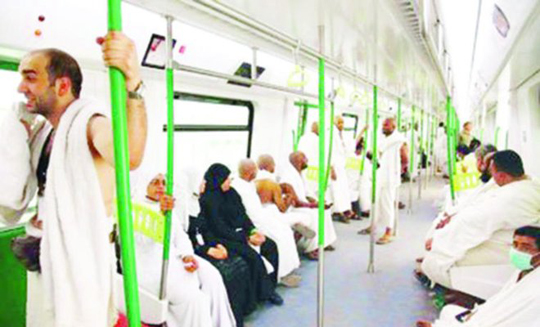Makkah, Jan 7: Some 311,000 pilgrims used the Haj Metro last season, with zero technical malfunctions and a high level of satisfaction with the system, an official report has said.

Makkah Gov. Prince Khaled Al-Faisal received a Makkah Development Authority evaluation of the operation of the Mashaer Railway, known as the Haj Metro, covering last year’s busiest pilgrimage season.
It found there were no malfunctions in the systems, trains or equipment at stations during Haj, which took place in September.
The report also said that the Haj Metro transported all passengers holding tickets, numbering around 311,000, according to a Saudi Press Agency report.
The Haj Metro links the southeast of Arafat, southwest of Mina and Muzdalifah. The track includes nine stations, each 300 meters long. Each train accommodates about 3,200 passengers, helping eliminate the use of many small vehicles and buses.
The report suggested the continued development and more investments to implement other train lines in the area, the SPA report said.
It noted efforts to distribute information pamphlets on how to use the train, as well as awareness films in three languages (Arabic, English and Urdu).
Makkah Development Authority assigned German TÜV SÜD Rail to inspect and evaluate the operation of the Haj Metro and compare the findings with results of studies over the past six years.
The company conducted field meetings with passengers and service providers and surveys of camps, tracks, stations and facilities, in addition to photography, video and scientific analysis of the data.
Passengers at stations were questioned on their satisfaction with the equipment, sanitation and hygiene services, with 74 percent saying they were very satisfied, 18 percent saying the services were average, and 7 percent saying they were unhappy.
The general satisfaction of users of the Haj Metro stood at 97 percent of respondents. With regard to equipment inside the train, customer satisfaction reached 95 percent, the survey found.
For next year’s Haj season, the German company has proposed the necessity for calibrating all the operating systems. The company urged the authorities to continue to prevent irregular access to the train areas and stations, and to prevent unauthorized pilgrims from accessing the railway areas.
It also said that pilgrim guides should comply with the grouping schedules put in place, and stressed the necessity of covering the station paths and slopes from direct sunshine, and to install cold water sprays to reduce the temperature.





Comments
Add new comment